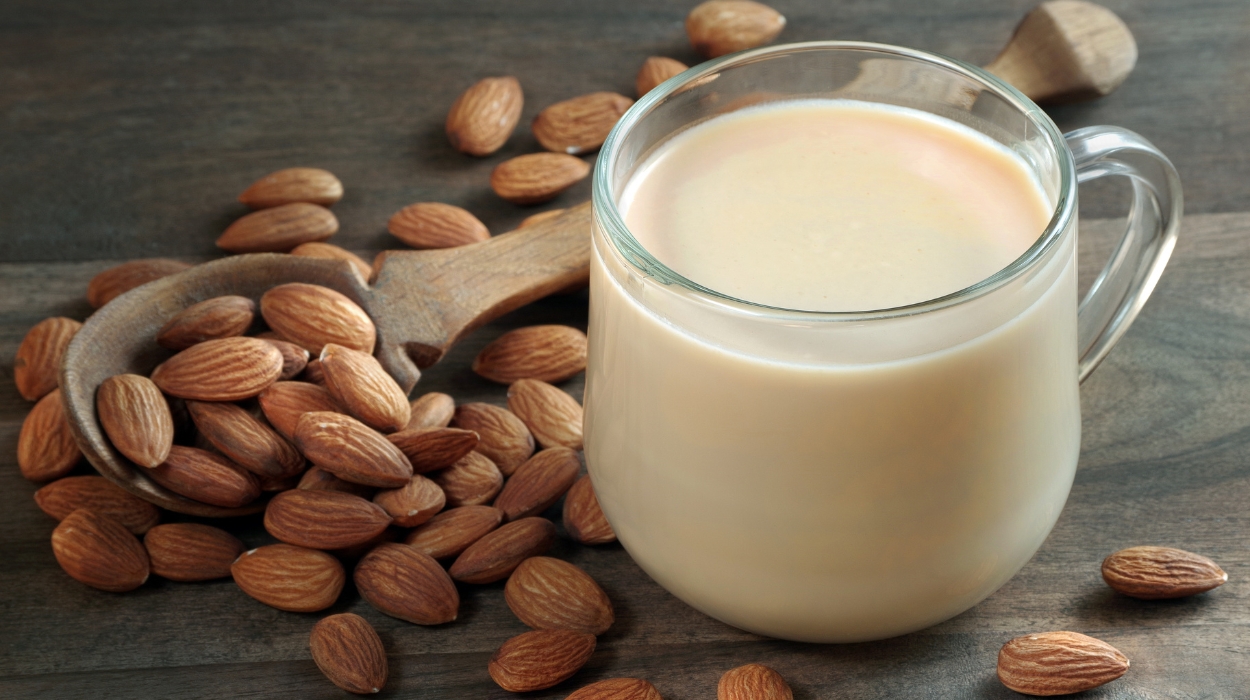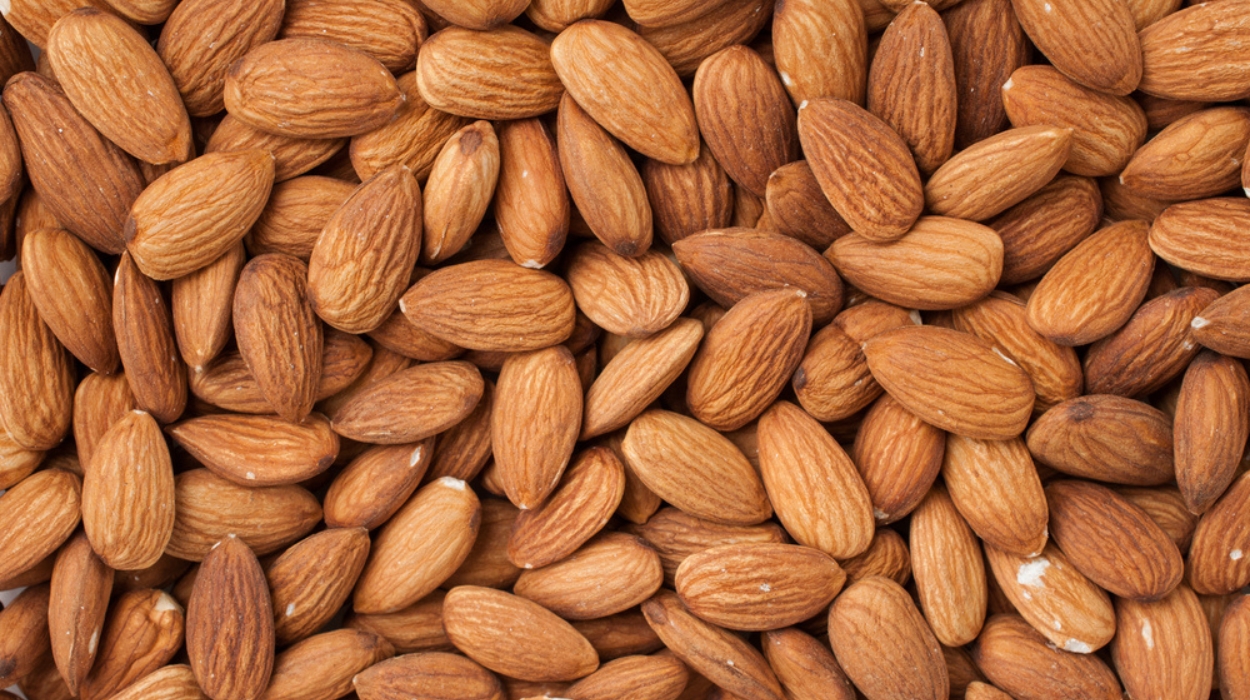Nuts are rich in fat and calorie-dense, so people often assume they are not good for weight loss. However, scientific research[1] shows that nut consumption doesn’t equal weight gain.
In fact, strategically incorporating nuts into a balanced diet can help with weight loss,[2] but are almonds one of these nuts? Explore below to find out the answer: are almonds good for weight loss?
Are Almonds Good For Losing Weight?
Yes, almonds can be a useful weight loss aid. Almonds are rich in nutrients and can help you feel full for longer periods, leading to better appetite control and lower calorie intake. They are also a good source of protein, healthy fats, and fiber, which can help eliminate cravings and support better eating habits and energy levels for sustained weight loss and maintenance.
Are Almonds Good For Weight Loss?

Almonds are among the most researched foods.[3] Over two decades of scientific investigation have been dedicated to unraveling the benefits of this little nut. One of the most promising benefits is weight loss. So, are almonds good for losing weight? The answer is yes, they can be, and here’s why.
Increases Feelings Of Fullness
Almonds are a good source of protein,[4] healthy monounsaturated fats, and fiber. This trio means snacking on almonds can promote satiety,[5] helping control eating habits and appetites.
Protein helps regulate hunger hormones,[6] healthy fats support sustained energy[7] and help regulate inflammation, and fiber promotes satiety.[5] Together, these effects can reduce calorie intake, ensuring you don’t eat too much or choose unhealthy food due to an energy crash.
Helps Balance Blood Sugar
One study[8] showed that those with type 2 diabetes who consumed almonds daily experienced significantly better blood sugar regulation. This benefit can be due to the fiber, protein, and healthy fats in nuts, making them a valuable addition to diets.
Good blood sugar regulation[9] is crucial for weight loss. Stable blood glucose levels prevent energy crashes and quick-fix sugary food cravings. This supports better food choices and overall weight management.
High Nutrient Density
Losing weight usually means following a calorie-restricted diet for a period of time. This increases the risk of losing out on certain essential nutrients. Almonds are nutrient-dense,[10] providing a rich supply of essential vitamins and minerals.
This nutrient density supports overall health, ensuring that the body receives vital nutrients even during periods of calorie restriction. These benefits holistically support weight loss. Studies suggest that a nutrient-dense whole-food diet[11] is best for sustainable weight loss.
Do Almonds Help You Lose Weight: What Do Studies Say?
A review[3] of over 60 almond studies and clinical trials confirmed that consuming them may contribute to lower body weight, weight control, and better metabolic health. Overall, it names almonds as food with many health benefits, with weight management being one of them.
A study[12] compared the impact of eating raw almonds as a snack to savory crackers or water. It revealed that those who consumed almonds experienced reduced hunger levels and suppressed the desire for high-fat foods. Almonds were also more effective at satisfying appetites, making them a weight-friendly mid-afternoon snack.
Additional research[5] found that snacking on almonds mid-morning affected feelings of fullness and overall food intake. As almond intake increased, food consumption at both lunch and dinner decreased. So, although almonds are calorie-dense, adding an almond snack does not increase overall daily calorie intake.
The Nutritional Value Of Almonds
As mentioned earlier, almonds are nutrient-dense nuts that can positively impact our health and waistlines. A 28-gram serving of almonds[13] provides 164 calories and contains:
- Fat: 14 grams.
- Carbohydrates: 6 grams.
- Protein: 6 grams.
- Fiber: 3.5 grams.
- Iron: 1.05 mg.
- Calcium: 76.3 mg.
- Magnesium: 76.5 mg.
As seen above, almonds are low in carbohydrates, making them a good choice for specialized low-carb diets[14] focusing on managing carbs per day to lose weight.
They also contain other essential micronutrients like folate, vitamin E, and potassium, which help promote better health during these weight loss diets.
How Many Almonds To Eat Per Day For Weight Loss
Most successful almond weight loss studies involve 40-50 grams of almond servings daily. For example, a research study[15] found that eating 1.5 ounces or 40 grams of almonds daily as a substitute snack resulted in abdominal fat loss.
Another study[16] comparing the effects of a nut-free diet with an almond diet found that those consuming 50 grams of almonds daily experienced weight loss. Lower blood pressure, LDL cholesterol (bad cholesterol)[17] levels, and cardiovascular risks were also noted.
However, these are just guidelines. There isn’t a one-size-fits-all recommended serving size because we all have different nutritional requirements.
Tips For Eating Almonds To Lose Weight

Almonds can be seamlessly incorporated into your diet due to their versatile nature and nutty flavor. Let’s explore some effective ways to incorporate almonds into a healthy diet:
Mindful Portion Control
As we saw earlier, almonds are both nutrient and calorie-dense. This means that portion control is necessary to ensure you don’t go over your calorie deficit to lose weight.
Try pre-portioning your almonds into small snack-sized bags. This helps prevent overeating and ensures you enjoy the health benefits without consuming excess calories.
Choose Raw Almonds
Opt for raw almonds over salted or roasted almonds. Raw almonds retain their natural nutrients without the added sodium or oils. This makes them a wholesome snack to support your weight loss efforts.
Pair Almonds With The Right Food Sources
Almonds can be added to almost anything from a fruit bowl, smoothie, salad, or curry. They can also be transformed into different snack and staple food options like almond butter, almond milk, and even almond flour. Be aware of foods to avoid to lose weight to ensure your almond pairings align with your weight loss goals.
Snack Smartly And Substitute
Substituting high-fat or carbohydrate-rich snack foods with almonds can help control hunger and cravings and prevent weight gain. It can also contribute to your daily fiber intake, helping you meet your recommended fiber per day to lose weight.
Stay Hydrated
Almonds have a low water content,[18] with only 4.2 grams per 100-gram serving. So, staying hydrated is essential when incorporating them into your weight loss diet.
You can also use this opportunity to use water to lose weight. Research[19] shows that water may help enhance weight loss in those who are dieting.
In addition to enhancing your almond diet with the tips mentioned above, you could also add a fat burner to your regime for more noticeable results. However, speak to a healthcare professional such as a registered dietitian before adding supplements such as these.
Conclusion
With over two decades of research, almonds consistently showcase a positive impact on weight loss. Their composition features a potent trio of macronutrients — protein, healthy fats, and fiber — supporting appetite control, sustained energy, and inflammation regulation.
Almonds also help balance blood sugar levels, further aiding weight loss by eliminating cravings. In addition, their essential micronutrients support the body during calorie restriction, creating a holistic approach to weight loss.
So, if your goal is to trim your waistline while reducing risks and improving your overall health, almonds can be a nutritious and versatile ally in weight loss.
Frequently Asked Questions
There is no set recommendation. Most trials investigating almonds for weight loss provide a 40-50 gram serving — around 33-42 almonds daily.
Yes, they can. Studies show that almonds can help reduce visceral belly fat[20] — especially in those with high cholesterol levels[15] and central obesity.
Yes, you can. An almond-enriched diet with mindful portion control can support weight loss due to its nutritional profile and impact on satiety.
There are approximately 139 calories in 20 almonds.
 Evidence Based
Evidence Based

